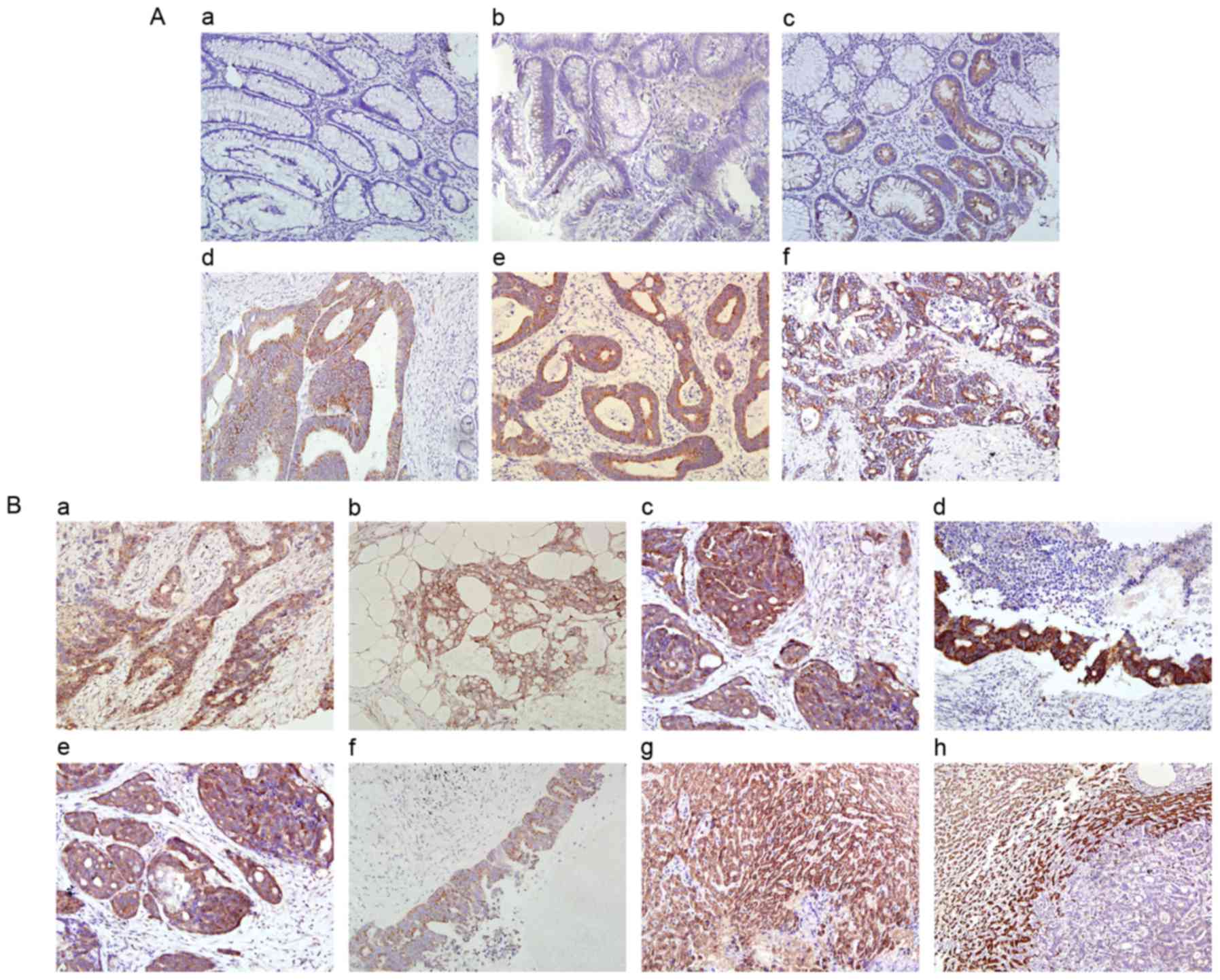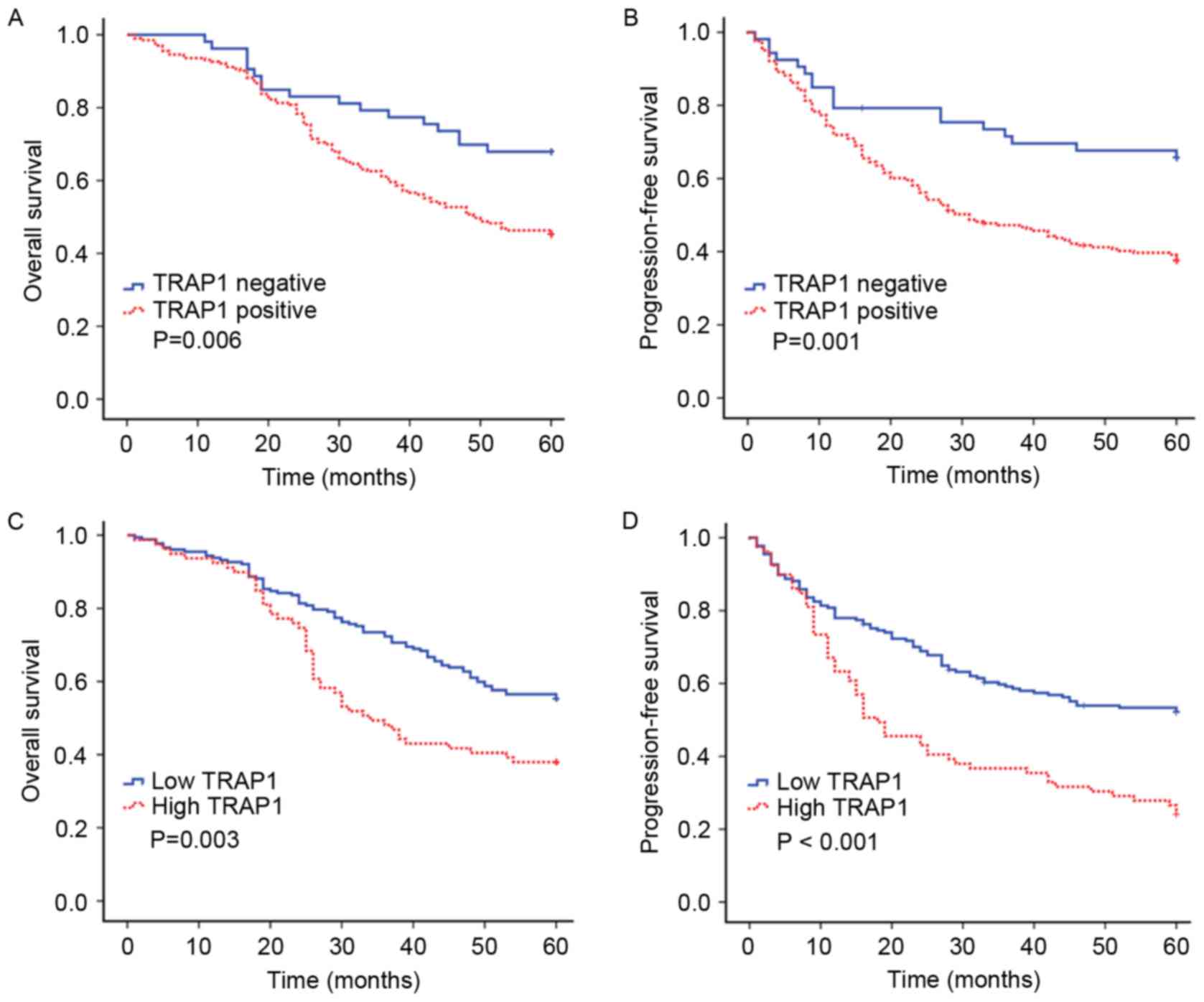|
1
|
Siegel R, Desantis C and Jemal A:
Colorectal cancer statistics, 2014. CA Cancer J Clin. 64:104–117.
2014. View Article : Google Scholar : PubMed/NCBI
|
|
2
|
Moniuszko T, Wincewicz A, Koda M,
Domysławska I and Sulkowski S: Role of periostin in esophageal,
gastric and colon cancer. Oncol Lett. 12:783–787. 2016. View Article : Google Scholar : PubMed/NCBI
|
|
3
|
Rogers AC, Winter DC, Heeney A, Gibbons D,
Lugli A, Puppa G and Sheahan K: Systematic review and meta-analysis
of the impact of tumour budding in colorectal cancer. Br J Cancer.
115:831–840. 2016. View Article : Google Scholar : PubMed/NCBI
|
|
4
|
Bond A, O'Toole P, Fisher G, Subramanian
S, Haslam N, Probert C, Cox T and Sarkar S: New-generation
high-definition colonoscopes increase adenoma detection when
screening a moderate-risk population for colorectal cancer. Clin
Colrectal Cancer. 16:44–50. 2017. View Article : Google Scholar
|
|
5
|
Chand M, Rasheed S, Heald R, Swift I, West
N, Rao S, Tekkis P and Brown G: Adjuvant chemotherapy may improve
disease-free survival in patients with persistently mrEMVI-positive
rectal cancer following chemoradiation. Colorectal Dis. 19:537–543.
2017. View Article : Google Scholar : PubMed/NCBI
|
|
6
|
Yuan D, Li K, Zhu K, Yan R and Dang C:
Plasma miR-183 predicts recurrence and prognosis in patients with
colorectal cancer. Cancer Biol Ther. 16:268–275. 2015. View Article : Google Scholar : PubMed/NCBI
|
|
7
|
Torre LA, Bray F, Siegel RL, Ferlay J,
Lortet-Tieulent J and Jemal A: Global cancer statistics, 2012. CA
Cancer J Clin. 65:87–108. 2015. View Article : Google Scholar : PubMed/NCBI
|
|
8
|
Simon K: Colorectal cancer development and
advances in screening. Clin Interv Aging. 11:967–976. 2016.
View Article : Google Scholar : PubMed/NCBI
|
|
9
|
Matassa DS, Amoroso MR, Maddalena F,
Landriscina M and Esposito F: New insights into TRAP1 pathway. Am J
Cancer Res. 2:235–248. 2012.PubMed/NCBI
|
|
10
|
Neckers L and Ivy SP: Heat shock protein
90. Curr Opin Oncol. 5:419–424. 2003. View Article : Google Scholar
|
|
11
|
Lianos GD, Alexiou GA, Mangano A, Mangano
A, Rausei S, Boni L, Dionigi G and Roukos DH: The role of heat
shock proteins in cancer. Cancer Lett. 360:114–118. 2015.
View Article : Google Scholar : PubMed/NCBI
|
|
12
|
Hua G, Zhang Q and Fan Z: Heat shock
protein 75 (TRAP1) antagonizes reactive oxygen species generation
and protects cells from granzyme M-mediated apoptosis. J Biol Chem.
282:20553–20560. 2007. View Article : Google Scholar : PubMed/NCBI
|
|
13
|
Kang BH, Plescia J, Dohi T, Rosa J, Doxsey
SJ and Altieri DC: Regulation of tumor cell mitochondrial
homeostasis by an organelle-specific Hsp90 chaperone network. Cell.
131:257–270. 2007. View Article : Google Scholar : PubMed/NCBI
|
|
14
|
Tian X, Ma P, Sui CG, Meng FD, Li Y, Fu
LY, Jiang T, Wang Y and Jiang YH: Suppression of tumor necrosis
factor receptor-associated protein 1 expression induces inhibition
of cell proliferation and tumor growth in human esophageal cancer
cells. FEBS J. 281:2805–2819. 2014. View Article : Google Scholar : PubMed/NCBI
|
|
15
|
Zhang B, Wang J, Huang Z, Wei P, Liu Y,
Hao J, Zhao L, Zhang F, Tu Y and Wei T: Aberrantly upregulated
TRAP1 is required for tumorigenesis of breast cancer. Oncotarget.
6:44495–44508. 2015. View Article : Google Scholar : PubMed/NCBI
|
|
16
|
Agorreta J, Hu J, Liu D, Delia D, Turley
H, Ferguson DJ, Iborra F, Pajares MJ, Larrayoz M, Zudaire I, et al:
TRAP1 regulates proliferation, mitochondrial function, and has
prognostic significance in NSCLC. Mol Cancer Res. 12:660–669. 2014.
View Article : Google Scholar : PubMed/NCBI
|
|
17
|
Leav I, Plescia J, Goel HL, Li J, Jiang Z,
Cohen RJ, Languino LR and Altieri DC: Cytoprotective mitochondrial
chaperone TRAP-1 as a novel molecular target in localized and
metastatic prostate cancer. Am J Pathol. 176:393–401. 2010.
View Article : Google Scholar : PubMed/NCBI
|
|
18
|
Gao JY, Song BR, Peng JJ and Lu YM:
Correlation between mitochondrial TRAP-1 expression and lymph node
metastasis in colorectal cancer. World J Gastroenterol.
18:5965–5971. 2012. View Article : Google Scholar : PubMed/NCBI
|
|
19
|
Rusch VW, Rice TW, Crowley J, Blackstone
EH, Rami-Porta R and Goldstraw P: The seventh edition of the
American Joint Committee on Cancer/International Union Against
Cancer Staging Manuals: The new era of data-driven revisions. J
Thorac Cardiovasc Surg. 139:819–821. 2010. View Article : Google Scholar : PubMed/NCBI
|
|
20
|
Hofheinz RD, Ronellenfitsch U, Kubicka S,
Falcone A, Burkholder I and Hacker UT: Treatment with
antiangiogenic drugs in multiple lines in patients with metastatic
colorectal cancer: Meta-analysis of randomized trials.
Gastroenterol Res Pract. 2016:291894832016. View Article : Google Scholar
|
|
21
|
Ou Y, Liu L, Xue L, Zhou W, Zhao Z, Xu B,
Song Y and Zhan Q: TRAP1 shows clinical significance and promotes
cellular migration and invasion through STAT3/MMP2 pathway in human
esophageal squamous cell cancer. J Genet Genomics. 41:529–537.
2014. View Article : Google Scholar : PubMed/NCBI
|
|
22
|
Khanna A, Böckelman C, Hemmes A, Junttila
MR, Wiksten JP, Lundin M, Junnila S, Murphy DJ, Evan GI, Haglund C,
et al: MYC-dependent regulation and prognostic role of CIP2A in
gastric cancer. J Natl Cancer Inst. 101:793–805. 2009. View Article : Google Scholar : PubMed/NCBI
|
|
23
|
Elias E, Mukherji D, Faraj W, Khalife M,
Dimassi H, Eloubeidi M, Hattoum H, Abou-Alfa GK, Saleh A and
Shamseddine A: Lymph-node ratio is an independent prognostic factor
in patients with stage III colorectal cancer: A retrospective study
from the Middle East. World J Surg Oncol. 10:632012. View Article : Google Scholar : PubMed/NCBI
|
|
24
|
Chew MH, Teo JY, Kabir T, Koh PK, Eu KW
and Tang CL: Stage IV colorectal cancers: An analysis of factors
predicting outcome and survival in 728 cases. J Gastrointest Surg.
16:603–612. 2012. View Article : Google Scholar : PubMed/NCBI
|
|
25
|
Chen R, Pan S, Lai K, Lai LA, Crispin DA,
Bronner MP and Brentnall TA: Up-regulation of mitochondrial
chaperone TRAP1 in ulcerative colitis associated colorectal cancer.
World J Gastroenterol. 20:17037–17048. 2014. View Article : Google Scholar : PubMed/NCBI
|
|
26
|
Hauptman N and Glavač D: Colorectal cancer
blood-based biomarkers. Gastroenterol Res Pract. 2017:221953612017.
View Article : Google Scholar
|
|
27
|
Montesano Gesualdi N, Chirico G, Pirozzi
G, Costantino E, Landriscina M and Esposito F: Tumor necrosis
factor-associated protein 1 (TRAP-1) protects cells from oxidative
stress and apoptosis. Stress. 10:342–350. 2007. View Article : Google Scholar : PubMed/NCBI
|
|
28
|
Nakagawa T, Shimizu S, Watanabe T,
Yamaguchi O, Otsu K, Yamagata H, Inohara H, Kubo T and Tsujimoto Y:
Cyclophilin D-dependent mitochondrial permeability transition
regulates some necrotic but not apoptotic cell death. Nature.
434:652–658. 2005. View Article : Google Scholar : PubMed/NCBI
|
|
29
|
Liu D, Hu J, Agorreta J, Cesario A, Zhang
Y, Harris AL, Gatter K and Pezzella F: Tumor necrosis factor
receptor-associated protein 1(TRAP1) regulates genes involved in
cell cycle and metastases. Cancer Lett. 296:194–205. 2010.
View Article : Google Scholar : PubMed/NCBI
|
|
30
|
Landriscina M, Laudiero G, Maddalena F,
Amoroso MR, Piscazzi A, Cozzolino F, Monti M, Garbi C, Fersini A,
Pucci P and Esposito F: Mitochondrial chaperone Trap1 and the
calcium binding protein Sorcin interact and protect cells against
apoptosis induced by antiblastic agents. Cancer Res. 70:6577–6586.
2010. View Article : Google Scholar : PubMed/NCBI
|
|
31
|
Guzzo G, Sciacovelli M, Bernardi P and
Rasola A: Inhibition of succinate dehydrogenase by the
mitochondrial chaperone TRAP1 has anti-oxidant and anti-apoptotic
effects on tumor cells. Oncotarget. 5:11897–11908. 2014. View Article : Google Scholar : PubMed/NCBI
|
|
32
|
Kubota K, Inoue K, Hashimoto R, Kumamoto
N, Kosuga A, Tatsumi M, Kamijima K, Kunugi H, Iwata N, Ozaki N, et
al: Tumor necrosis factor receptor-associated protein 1 regulates
cell adhesion and synaptic morphology via modulation of N-cadherin
expression. J Neurochem. 110:496–508. 2009. View Article : Google Scholar : PubMed/NCBI
|
















